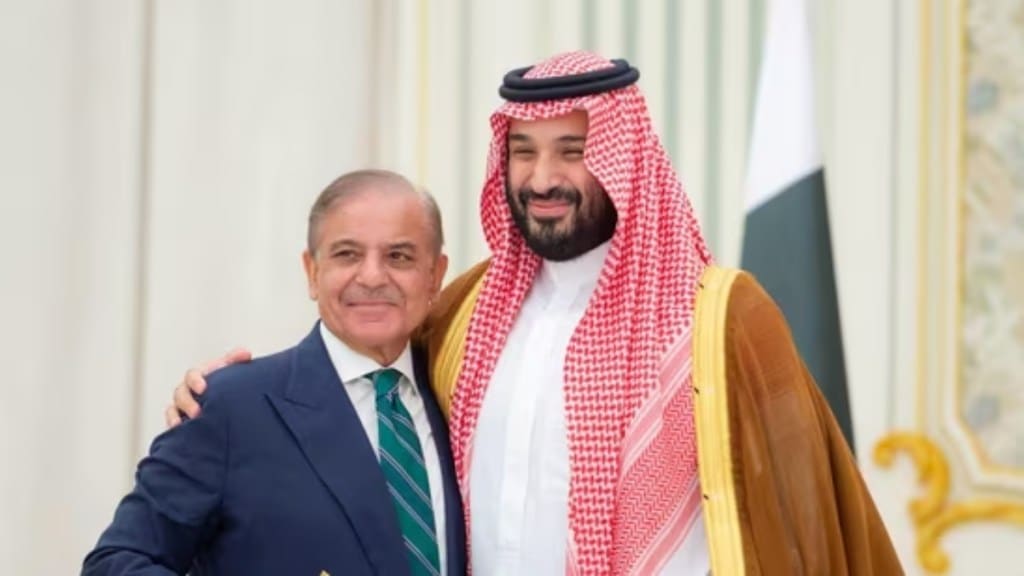By Anita Inder Singh
Donald Trump’s troublemaking global politics, and his support for Israel’s attacks on six Arab countries in one week, provoked Saudi Arabia to sign a mutual defence pact with nuclear-armed Pakistan in Riyadh on September 17. The victim states included Qatar, a non-North Atlantic Treaty Organization ally which sees US defence promises looking shakier than ever after Israel’s strike on Doha on September 9. This is the first major defence deal between an Arab state and a country with n-weapons. Asked whether Pakistan would provide Saudi Arabia with a nuclear umbrella under the pact, a Saudi official asserted: “This is a comprehensive defensive agreement that encompasses all military means.”
Simultaneously, this is Pakistan’s most significant military accord in decades. It is economically weaker than its perceived ideological and territorial arch-foe, India, and both are nuclear powers. Official Delhi has wisely remained circumspect, but some Indians opine that Pakistan could use the accord to threaten India’s security.
Trump supported Israel’s claim that it was hunting down Hamas in Arab countries, but he and Israel’s aggressiveness have not impressed most states. The damage done to international and West Asian politics has South Asian ramifications, given the old territorial-religious dispute over Kashmir between India and Pakistan.
Consequences of the pact
Saudi Arabia enhances its status by aligning with a nuclear power. The Saudi-Pak deal is backed by strong relations between the two countries since the 1960s. Headlines have been made worldwide by the pact’s major clause, which reads that “any aggression against either country shall be considered an aggression against both”. The agreement mirrors the “shared commitment” to achieve regional and international security and peace in the face of Israel’s increased belligerence.
Pakistan has trained the Saudi military since long and has some 2,000 soldiers on Saudi soil. Islamabad has been rewarded with generous Saudi financial support that has enabled its nuclear programme to continue. Saudi money will now enable Pakistan to buy the US weapons it needs, and which the Trump administration appears willing to sell.
For Saudi Arabia, the accord also strengthens defences against threats from a nuclear-ambitious Iran, Yemen’s Houthi militias, and the regional turbulence caused by Israel in West Asia.
Delhi is aware that the pact has resulted from years of negotiations between Pakistan and Saudi Arabia, so it remains calm.
India-Saudi ties have grown since 2006, when Prime Minister Manmohan Singh was in power. Saudi Arabia has for long invested in a political, strategic, and economic relationship with India. India is the second-largest trade partner of Saudi Arabia, whereas the kingdom is the fifth-largest trading partner of India. There is also an Indian diaspora, amounting to about 2.5 million, in Saudi Arabia.
During the Pahalgam attack on April 22, Prime Minister Modi was in Saudi Arabia, whose rulers condemned the incident. The Saudi-Pak deal therefore comes less than five months after the brief Indo-Pak conflict in May. The Saudi minister of state for foreign affairs, Adel al-Jubeir, made an unannounced visit to India during Operation Sindoor. The Saudis have sought to talk to both India and Pakistan during times of conflict between them. Riyadh has assured Delhi that “our relationship with India is more robust than it has ever been. We will continue to grow this relationship and seek to contribute to regional peace whichever way we can”.
The agreement will have consequences for Pakistan’s domestic politics.
Pakistan has been ruled by its military for more than half of its 78-year history. The army remains Pakistan’s most powerful institution, although it claims to have quit politics. Civilian administrations often find themselves playing by the rules set by military leaders. It is significant that Pakistan’s army chief, Field Marshal Asim Munir, the most powerful man in the country, was present when Crown Prince Mohammed bin Salman and Pakistan’s Prime Minister Shehbaz Sharif signed the pact in Riyadh. Any defence agreement will add weight to the Pakistani military’s power, at home and abroad. It can be expected to intrude more frequently into domestic affairs. Weak democratic values will therefore be eroded and civilian governance diminished. Pakistan’s opposition parties, media, and human rights activists could find themselves being bullied into sticking to rules imposed by the military and refraining from questioning or criticising them.
China is pleased
China, whose Belt-and-Road Initiative has both Saudi Arabia and Pakistan on board, has welcomed the deal between its friends. Significantly, China sees Pakistan as a nuclear power with “a relatively balanced and mature foreign policy, making it a uniquely valuable ally” for Saudi Arabia.
Riyadh has helped one of China’s big three state-owned oil companies to expand. In return, China is backing Saudi Vision 2030, which aims to develop major sectors including health, education, infrastructure, innovation, and sustainability, and to align them with global standards.
As a result of the deal, a prosperous Saudi Arabia could gain more clout in South Asia first, because it is now Pakistan’s ally, and second, because Riyadh and Delhi wish to maintain their strong relationship. Because of its nuclear power, a weak Pakistan could, outwardly at least, acquire more influence in West Asia.
Few countries will swallow Trump’s nonsense that Qatar is an ally which Israel will not strike “again”. But rich West Asian countries—and not-so-rich India and Pakistan—must realise that even deals worth billions of dollars are at risk with an American president who is a law unto himself and unable to practise responsible international statecraft.
The writer is founding professor, Centre for Peace and Conflict Resolution, New Delhi.
Disclaimer: Views expressed are personal and do not reflect the official position or policy of FinancialExpress.com. Reproducing this content without permission is prohibited.
